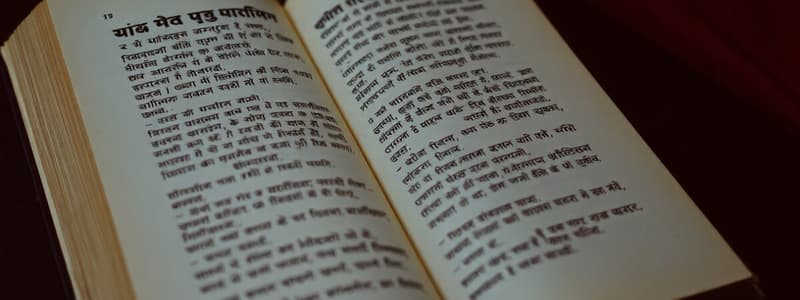Podcast
Questions and Answers
What script is used to write the Bengali language?
What script is used to write the Bengali language?
- Cyrillic script
- Latin script
- Brahmi script
- Bengali script (correct)
Who was the first non-European laureate to win the Nobel Prize in Literature?
Who was the first non-European laureate to win the Nobel Prize in Literature?
- Jibanananda Das
- Rabindranath Tagore (correct)
- Kazi Nazrul Islam
- Hermann Hesse
Which festival is celebrated as the Bengali New Year?
Which festival is celebrated as the Bengali New Year?
- Bhai Fota
- Eid
- Pohela Boishakh (correct)
- Durga Puja
What major event in 1947 significantly impacted the social fabric of Bengal?
What major event in 1947 significantly impacted the social fabric of Bengal?
In which geographical feature is the Bengali-speaking population primarily located?
In which geographical feature is the Bengali-speaking population primarily located?
What is a significant influence of the global Bengali diaspora?
What is a significant influence of the global Bengali diaspora?
Which cuisine ingredient is particularly known as a delicacy in Bengali food?
Which cuisine ingredient is particularly known as a delicacy in Bengali food?
What form of government does Bangladesh currently have?
What form of government does Bangladesh currently have?
Which notable period is associated with significant cultural awakening in Bengali history?
Which notable period is associated with significant cultural awakening in Bengali history?
Which river delta is significant to the geography of the Bengali region?
Which river delta is significant to the geography of the Bengali region?
Flashcards are hidden until you start studying
Study Notes
Language
- Bengali (Bangla) is an Indo-Aryan language spoken primarily in Bangladesh and the Indian state of West Bengal.
- It is the 7th most spoken language in the world, with over 230 million native speakers.
- Uses the Bengali script, which is a syllabic alphabet derived from the Brahmi script.
Literature
- Bengali literature is rich and diverse, with a long history stemming from the early medieval period.
- Notable poets: Rabindranath Tagore (first non-European Nobel laureate in Literature), Kazi Nazrul Islam, Jibanananda Das.
- Important literary forms include poetry, novels, and short stories.
Culture
- Bengali culture places a strong emphasis on arts, music, dance, and festivals.
- Major festivals: Durga Puja, Pohela Boishakh (Bengali New Year), Eid, and Bhai Fota.
- Cuisine is known for its use of rice, fish, and lentils, often flavored with spices like mustard and hilsa fish as a delicacy.
History
- The Bengali region has a rich history influenced by various dynasties including the Maurya, Gupta, Pala, and Mughal empires.
- The Bengal Renaissance of the 19th-20th century saw significant cultural, social, and political awakening.
- The partition of Bengal in 1905 and again in 1947 significantly impacted its social fabric.
Geography
- The Bengali-speaking population is primarily concentrated in Bangladesh (population over 160 million) and the Indian state of West Bengal (population over 90 million).
- The region is characterized by fertile plains, the Ganges Delta, and numerous rivers, which contribute to its agricultural significance.
Politics
- Language Movement of 1952 in Bangladesh emphasized the importance of Bengali as an official language, leading to eventual independence from Pakistan in 1971.
- Currently, Bangladesh is a parliamentary democracy, while West Bengal is governed as a state in India.
Modern Influence
- Bengali cinema (Tollywood) is influential, known for artistic films and commercial success.
- The global diaspora has contributed to the spread of Bengali culture and language worldwide.
Language
- Bengali is an Indo-Aryan language.
- Spoken primarily in Bangladesh and West Bengal, India.
- 7th most spoken language globally, with over 230 million native speakers.
- Uses the Bengali script, originating from the Brahmi script.
Literature
- Bengali literature has rich history, beginning in the early medieval period.
- Notable poets include Rabindranath Tagore, Kazi Nazrul Islam, and Jibanananda Das.
- Tagore was the first non-European Nobel laureate in Literature.
- Important forms include poetry, novels, and short stories.
Culture
- Bengali culture values arts, music, dance, and festivals.
- Major festivals include Durga Puja, Pohela Boishakh (Bengali New Year), Eid, and Bhai Fota.
- Cuisine is known for rice, fish, and lentils, often flavored with spices like mustard.
- Hilsa fish is considered a delicacy.
History
- The Bengali region's history is influenced by dynasties like the Maurya, Gupta, Pala, and Mughal empires.
- The Bengal Renaissance (19th-20th century) saw significant cultural, social, and political changes.
- The partition of Bengal in 1905 and 1947 had a significant impact on the social fabric.
Geography
- Bengali-speaking population is concentrated in Bangladesh (over 160 million) and West Bengal, India (over 90 million).
- The region is known for fertile plains, the Ganges Delta, and numerous rivers.
- This contributes to its agricultural significance.
Politics
- The Language Movement of 1952 in Bangladesh emphasized the importance of Bengali as an official language.
- This led to independence from Pakistan in 1971.
- Currently, Bangladesh is a parliamentary democracy, while West Bengal is a state within India.
Modern Influence
- Bengali cinema (Tollywood) is recognized for artistic and commercial success.
- The global Bengali diaspora has contributed to the spread of Bengali culture and language worldwide.
Studying That Suits You
Use AI to generate personalized quizzes and flashcards to suit your learning preferences.



